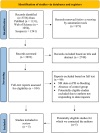Safety of Anticoagulant Treatment in Patients With Splanchnic Vein Thrombosis and History of Portal Hypertension-Related Bleeding
- PMID: 40298453
- PMCID: PMC12039759
- DOI: 10.1111/liv.70114
Safety of Anticoagulant Treatment in Patients With Splanchnic Vein Thrombosis and History of Portal Hypertension-Related Bleeding
Abstract
Splanchnic vein thrombosis (SVT) can be associated with liver cirrhosis or prothrombotic conditions, including myeloproliferative disorders, intra-abdominal inflammation, solid cancers or surgery. While anticoagulation therapy improves outcomes in noncirrhotic patients and reduces all-cause mortality in cirrhotic populations, its safety in patients with a history of portal hypertension (PH)-related bleeding is less clear. This systematic review examines the impact of anticoagulant therapy on rebleeding risk in SVT patients with a history of PH-related bleeding. A systematic review and meta-analysis were conducted according to PRISMA guidelines. A comprehensive search of PubMed, Web of Science and Scopus was performed for studies published up to September 2024. Studies were included if they compared SVT patients with a history of PH-related bleeding receiving anticoagulant therapy versus those not receiving anticoagulants. The primary outcome was the cumulative incidence of PH-related rebleedings. Of 2853 identified studies, five (186 participants) met the inclusion criteria: two randomised controlled trials (RCTs) and three observational studies. The cumulative incidence of PH-related rebleeding was significantly lower in the anticoagulant group at 17.10% [95% CI 17.02, 17.19] compared to the control group at 40.00% [95% CI 39.90, 40.09]. The overall odds ratio (OR) from observational studies was 0.15 [95% CI 0.04, 0.52], indicating a reduced bleeding risk, while the OR from RCTs was 0.84 [95% CI 0.31, 2.32], showing a nonsignificant trend. Anticoagulant therapy may reduce rebleeding risk in SVT patients with a history of PH-related bleeding, but further high-quality studies are needed.
Keywords: bleeding history; portal hypertension‐related bleeding; splanchnic vein thrombosis.
© 2025 The Author(s). Liver International published by John Wiley & Sons Ltd.
Conflict of interest statement
The authors declare no conflicts of interest.
Figures


References
-
- Thatipelli M. R., McBane R. D., Hodge D. O., and Wysokinski W. E., “Survival and Recurrence in Patients With Splanchnic Vein Thromboses,” Clinical Gastroenterology and Hepatology: The Official Clinical Practice Journal of the American Gastroenterological Association 8, no. 2 (2010): 200–205, 10.1016/j.cgh.2009.09.019. - DOI - PubMed
Publication types
MeSH terms
Substances
LinkOut - more resources
Full Text Sources
Medical
Miscellaneous

